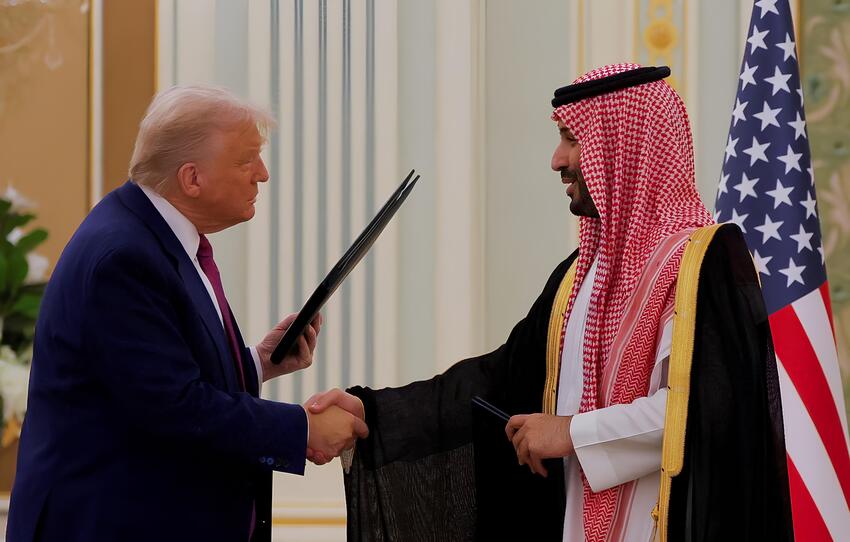World Geostrategic Insights interview with Steven Terner on US-Gulf relations under the Trump administration, investments as a tool for geopolitical leverage, Trump’s Middle East strategy and growing influence of Gulf countries in shaping American policy in the region.

Dr. Steven Terner is a geopolitical analyst and international business consultant at Terner Consulting (www.TernerConsulting.com). He holds a master’s degree in Middle Eastern Studies, a master’s degree in Government, a PhD in Contemporary Middle Eastern History, and publishes frequently on Middle Eastern political economy and US foreign policy, including newsletters focused on Iranian and Israeli political economy.
Q1 – During Trump’s trip to the Middle East last May, long-term investment agreements worth over a trillion dollars were signed with Saudi Arabia, Qatar, and the United Arab Emirates, covering sectors such as defense, healthcare, economic infrastructure, artificial intelligence, and technology. Are we witnessing a change in relations between the US and the Gulf, which are moving from traditional ‘oil for security’ agreements to stronger economic partnerships and bilateral investments, with a view to facilitating long-term interdependence through economic ties? How important is achieving economic goals in Trump’s foreign policy?
A1 – Yes, we are witnessing a change in relations between the US and the Gulf. The relationship under the current US administration has shifted from strategic to transactional. The traditional US relationship with the Gulf has been quite complex. It was based on the strategic needs of the United States regarding the consistent flow of its energy supply, as well as intelligence sharing that allowed the US to protect its regional and global interests, and relied on soft power to leverage influence on other global foreign policy issues.
However, the current relationship being forged is much simpler. The Trump administration is less concerned with intelligence sharing and soft power, so it does not use such influence to bring about strategic, social, or economic changes. That being said, it does still rely on the steady flow of energy from the Gulf. It is making deals with the Gulf countries that are based virtually exclusively on economic investment. These deals are made while paying little attention to their geopolitical context. This could, in theory, lead to long-term strong economic partnerships, but interdependence requires more than just economic investment.
If anything, by focusing exclusively on economic investment, and letting go of the traditional soft power development and strategic sharing of intelligence and regional security cooperation, that had been part and parcel of the relationship between the US and Gulf countries, the relationship is becoming significantly less interdependent.
Gulf countries can offer the US money for investment, energy, and strategic cooperation, but their economies are not developed enough to become economically interdependent with the United States. Focusing on their economic partnership and letting their strategic component fall by the wayside is therefore weakening the relationship between the US and the Gulf in the long term.
Q2 – Are the economic agreements signed by President Trump with Gulf countries aimed not only at strengthening American partnerships in the Middle East, but also at countering China’s growing influence in the region?
A2 – The economic agreements being signed are rhetorically designed to counter Chinese influence in the region. However, the details of the deals, which are still being ironed out, will determine the extent to which Chinese influence will be countered. Rather than countering influence, attention should be paid to the details that limit the sharing of US proprietary technology with China.
Gulf countries see China as a source for economic investment, but they are wary of China for a variety of reasons. On the ground, retail sellers who distribute Chinese goods have trouble moving merchandise because the quality tends to be poor, and their customers therefore do not return to purchase Chinese goods for a second time.
At the diplomatic level, Chinese development projects around the world have earned a poor reputation for a number of reasons. For instance, they stall, sometimes indefinitely, so projects are often left incomplete. Chinese development projects are also known to opt not to train local workers, but instead to rely on Chinese labor, which is resented by local populations.
While these projects are popular at the government level for appearing to provide future success and offering huge sums of money to be pilfered by the ruling class, they lead to civil unrest in the long term and are therefore losing their luster as time goes on. Chinese influence in the region is therefore dependent more on China itself than on the US putting lines into deals that limit Gulf cooperation with China. US agreements with Gulf countries, instead, are interested in preventing the sharing of US technology, such as microchips, processors, and other military-use items, with China.
Q3 – Global power is increasingly exercised through investment flows, economic partnerships, and digital infrastructure. How are economic interests driving, or influencing, foreign policy decisions?
A3 – I would argue the opposite, that investment is one way in which global soft power is attained. Countries that are unable to build interdependent economic and strategic relationships because they lack the ability to offer goods, services, and other needs of countries, instead make extremely large investments in the political centers of countries in which they hope to wield influence.
For example, Saudi Arabia, the UAE, and Qatar do not have well-developed economies. They are therefore unable to offer countries like the United States goods or services in quantities that the United States could come to depend upon. What these countries do have, however, is a lot of wealth. They, therefore, must be strategic about how they use this, their primary resource. So, in order to influence policy decisions, they court the institutions and individuals who are involved in the policy decision-making process by investing and donating large sums of money to allow them to operate in exchange for guiding the narrative regarding the policies that are important to them.
Q4 – During his visit to Saudi Arabia, Donald Trump criticized the former Biden administration and called for a geopolitical reset in the Middle East, urging the expansion of the Abraham Accords and greater cooperation against regional threats, particularly Iran and terrorism. Does Donald Trump have a coherent vision, a real strategy, and a plan of action for the Middle East? How important is this region for the United States in the overall context of its foreign policy?
A4 – The Trump administration’s vision for the Middle East, at this point, is essentially what Saudi Arabia, the UAE, and Qatar envision. This can be seen in a variety of ways, specifically the way the Trump administration’s policies shifted abruptly leading up to, during, and immediately following the trip to the Gulf.
Right before the trip, the Trump administration signed a separate peace deal with the Houthis that left Israel out of the negotiation process. Before this, Israel had always been involved with the US in Middle East negotiations, and the Houthis in particular had an issue of intimate collaboration between the US and Israel because the Houthis had been targeting Israel specifically. The abrupt removal of the Israelis from the Houthi issues by the Trump administration came at the behest of Saudi Arabia because it wished to reduce its conflict with the Houthis.
During the trip to the Gulf, the Trump administration negotiated with Hamas directly to release an American citizen being held hostage in the Gaza Strip. This came at the behest of Qatar, hoping to resolve the Gaza War and the ongoing hostage crisis. However, this was also an abrupt change in US policy because until this negotiation, the US had refused under any and all circumstances to negotiate with Hamas, and had instead been calling for its complete destruction.
The Trump administration also abruptly not only recognized the Syrian interim government as legitimate, but US President Trump even met in person with Syrian interim president Al-Sharaa during the trip, and promised to lift all US sanctions on Syria. This came at the request of Saudi Arabia and the UAE, who intend to compete for influence with Iran and Turkey in Syria. This was also an abrupt change from US policy immediately before the trip, which had called Al-Sharaa a terrorist and refused to acknowledge his government as legitimate due to his party’s historical ties to Al-Qaeda.
In each case, US policy shifted abruptly and significantly at the behest of Saudi Arabia, the UAE, and Qatar, showing that US policy in the Middle East was simply cast off and replaced by Saudi Arabian, Emirati, and Qatari regional policies.
Dr. Steven Terner – Geopolitical analyst and international business consultant.
Image Credit: Brian Snyder/Reuters (President Donald Trump and Saudi Crown Prince and Prime Minister Mohammed Bin Salman during a Memorandum of Understanding signing ceremony at the Royal Court in Riyadh, Saudi Arabia).







